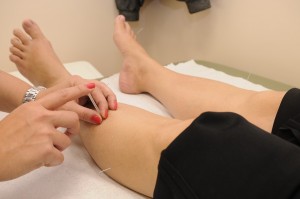
While the cause of Rheumatoid Arthritis is not yet fully known, it is suspected that some people may be genetically susceptible to infection with microorganisms, others may be affected by hormones, diet and/or smoking, all of which are recognised as possible risk factors.
What are rheumatoid arthritis symptoms?
The symptoms of Rheumatoid Arthritis tend to start with pain in the joints, redness, swelling, heat around the joints and a loss of function. Many people also experience low grade fever and fatigue as a result of the condition.
The course of Rheumatoid Arthritis is often variable, it tends to affect the smaller joints such as fingers and toes, subsequently the wrists, elbows, shoulders, knees and ankles may be affected too. Longer term, in some cases larger joints such as the hip can show signs of the condition.
Once diagnosed with Rheumatoid Arthritis those with the condition may notice symptoms gradually increasing over a period of time, initially pain can be brought on by movement, with the progression of symptoms, pain may be also be experienced when resting. The condition is characterised by periods of symptom flare up and remission. Treatment will often vary according to the phase of symptoms.
Is there a cure for rheumatoid arthritis?
A cure for the disease is not yet available, however, there are many forms of treatment and lifestyle changes which can help those living with Rheumatoid Arthritis control their pain and inflammation, reduce join damage, disability and loss of function.
Traditional acupuncture has been found to be of value in the treatment of Rheumatoid Arthritis. Acupuncture can be used as a supplement to pharmaceutical intervention, or in some cases, as an alternative to it all together. Research into traditional acupuncture and its benefits to those with Rheumatoid Arthritis is an ongoing process, though several studies have shown that for some sufferers traditional acupuncture can be as good and, in some cases, better than pharmaceuticals.
How can acupuncture help rheumatoid arthritis?
Traditional acupuncturists are often able to help with reducing pain and stiffness and maintaining mobility. Dependent upon the type of pharmaceutical treatment being prescribed to manage the Rheumatoid Arthritis, acupuncture treatment may vary, for example, if corticosteroids have been used long term the responsiveness to traditional acupuncture can be sooner. Effective management of pain and symptom reduction is still possible in those that have not used corticosteroids, it just may take a little longer.
Self-management is an important element of the treatment of Rheumatoid Arthritis, those with the condition are advised to take a proactive approach to diet and lifestyle to compliment pharmaceutical and holistic treatments. Along with acupuncture treatments, traditional acupuncturists are often able to recommend changes to diet and lifestyle which have been found to be beneficial to those diagnosed with Rheumatoid Arthritis.
Traditional acupuncturists at Newcastle Sports Injury Clinic are happy to discuss how traditional acupuncture could help you manage the symptoms of Rheumatoid Arthritis.